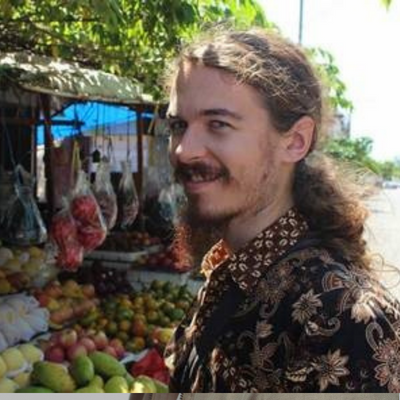Laurent Bellemare
Master's dregree in musicology student

- Tell us about your background?
I’m from Montréal, and I began my life in music as a self-taught death metal singer. More formal music learning came to me through drumming courses, which I started around the age of thirteen, when I was doing my first shows as a singer. So I first set myself up as a metal singer, then redoubled my efforts on drums by doing a jazz drumming program at Cégep de Saint-Laurent in 2012. I was a music lover before I was a musician, and very curious by nature, I was really fascinated by my music literature courses at Cégep, which led me to a bachelor’s in musicology at Université de Montréal (2014-2018), then a master’s in musicology (2019-2021). During those studies I discovered the Indonesian gamelan and fell in love with it, which among other things led me to study music in Bali for twelve months. Outside Université de Montréal I carried on practicing both drums and throat singing in different music projects and bands. Right now I’m in the gamelan ensemble Giri Kedaton, an organization in residence at the Faculty of Music, and Kumpa’nia as a percussionist, as well as Growlers Choir and Sutrah as a singer.
- You did an exchange during your studies. Tell us about that experience.
I did my exchange program at the National Taiwan Normal University (NTNU) in Taipei. The ethnomusicology department was small, but I created strong ties with some teachers and students, and I was made to feel welcome. I also really enjoyed the Mandarin Training Center, where Mandarin is taught, and which was located on the campus of my host university. I spent a lot of hours there learning Mandarin!
I hadn’t necessarily ever planned learning Mandarin in my life, but that introduction to the language and that proximity to Chinse-speaking culture and history, especially in the context of the island of Taiwan, was extremely enriching.
- What characterizes this institution, in your view?
I’d say, in the case if the ethnomusicology department (at the graduate level), it’s the friendliness of the place and of the members. It’s a small building with very few classrooms, but it’s charming and has a dedicated team. Also, the university is located in the heart of town, and has a whole ecosystem around it.
- How did that experience in Taiwan mark your life?
2019 was the busiest year in my life. A few months short of the COVID-19 epidemic turning into a worldwide pandemic, I still got the chance to study for four months in Taiwan and have a gateway to a part of the world I was only slightly familiar with. I was also able to make a number of short trips during that stay, notably to Hong Kong, Macau, Singapore and Mongolia. Considering what was about to happen in 2020, I was enormously lucky to be able to do those things. In the longer term, I intend continuing to learn Mandarin, because I’m fascinated by the mechanisms of that language.
- What would you say to students thinking about setting off to study abroad?
Don’t put it off, and don’t let yourself be discouraged by the paperwork! Get information, play the game, and ask for help from Mélissa Levasseur-Dupuis, international mobility coordinator at the Faculty of Music, and from the UdeM’s Maison internationale. The different stages will eventually happen, and at the end of the day you’ll have built yourself a one-of-a-kind curriculum.
- In your studies so far at the Faculty of Music, you’ve no doubt come across significant individuals who’ve had an impact on your development. Could you talk to us about some of them?
The member of the Université de Montréal Faculty of Music teaching staff who’s affected me most is unquestionably Caroline Traube. Her background in engineering sets her apart from all the other musicology teachers, and I thank her for allowing me to rethink the possibilities of my own discipline. As far as students are concerned, my friends Sarah Lecompte-Bergeron and I Putu Arya Deva Suryanegara, co-director of the Faculty of Music Gamelan Workshop, who, like me, have had highly unusual journeys in music.
- Describe an ambitious project you’ve worked on.
All the projects I’ve participated in with Giri Kedaton have been an enormous source of satisfaction. Since I started with the band in 2015, we’ve taken part in the Société de musique contemporaine du Québec’s José Evangelista tribute series, gone on tour in New Brunswick, recorded a disc (to be released) and premiered a number of important works by the composer I Putu Arya Deva Suryanegara.
- Who’s your favorite artist, and why?
I’m discovering new music every day, so it’s impossible to identify the artist I like the most. But I can say that my favorite music “genres” are the following: extreme metal, Indonesian gamelan, contemporary music and electronic music “not to dance to.”
- What are your inspirations?
More and more I’m fascinated by conceptual science fiction, those futuristic stories that primarily develop ideas and not just a situation or something superficial. Take, for example, series like Dune and Foundation, whose authors’ vision concerns the fate of humankind over the very long term.
- What are the 3 most important qualities for a musician?
Curiosity, an artistic brain capable of making cross-linkages between a climbing plant and the outcome of a film by Tarkovsky, and finally, the ability to respect the other artists you collaborate with.
- What are your plans for the future?
Publishing my master’s thesis as a book. Doing a doctorate on analyzing throat singing and the death metal voice. And continuing to do music and research at the same time.
August 2022